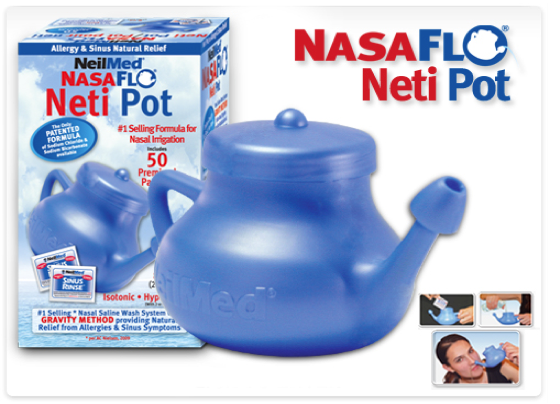 When I first saw this freebie I was like “Horrary a free tea pot – I love tea” ahh how had my dreams dashed when I took a closer look, it was actually for a Neti Pot. Don’t know what a Neti Pot is? Keep reading because I am going to share this freebie promotion with you.
When I first saw this freebie I was like “Horrary a free tea pot – I love tea” ahh how had my dreams dashed when I took a closer look, it was actually for a Neti Pot. Don’t know what a Neti Pot is? Keep reading because I am going to share this freebie promotion with you.
This is how you get your freebie;
1) Become a Facebook fan of NeilMed Neti Pot
2) Fill out their form (it’s a survey and it must be 100% correct to qualify)
3) That’s it, they will send you a free NeilMed NasaFlo Neti Pot with two packets of Nasal Wash.
This promotion wont last forever, but I don’t know when it will exactly expire and of course is only open to new fans and one per customer.
What is a Neti Pot: A neti pot is a small pot used for irrigating the nasal passages. Typically it has a spout attached near the bottom, sometimes with a handle on the opposite side.
Historically, neti pots were used in yoga (in India, where yoga originated) to assist in clearing the nasal passages, since controlled breathing plays a central role in yoga. The neti pot was introduced to the West approximately thirty years ago, and today many people in the West have taken up a modified type of Neti practice called Jala Neti (water neti) using a neti pot.
The use of a neti pot requires mixing up a saline solution that will be poured through the nasal passages. A typical saline solution is a mixture of around one pint of water with a teaspoon of salt. Sodium bicarbonate is sometimes added (half a teaspoon) to buffer the solution and make it more gentle on the sinuses, but the effectiveness of this is unproven. The neti pot used with a saline solution has been shown to be an effective treatment for hay fever, sinusitis, and other nasal conditions. Both isotonic and hypertonic saline is used for Neti.
In modern times, saline nasal irrigation (SNI) has become more widely accepted as a home remedy to relieve conditions such as allergies (such as hay fever), colds and mild sinus infections. Preliminary research indicates that SNI could also be an effective treatment for allergic rhinitis and chronic sinusitis. A conference abstract presented in November 2009 indicated that frequent nasal irrigation led to higher rates of sinus infections. Short term use, however, seemed to be effective.
